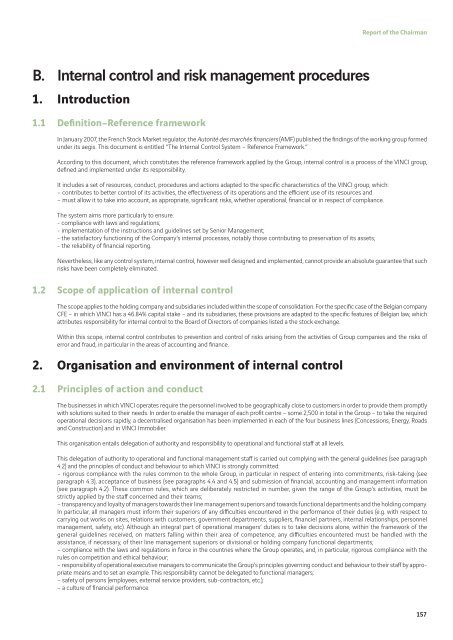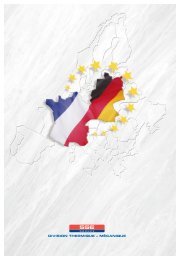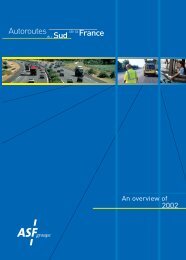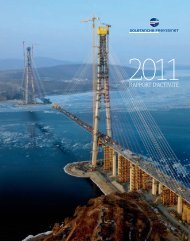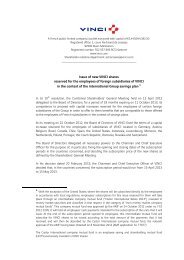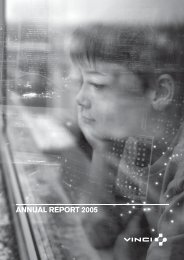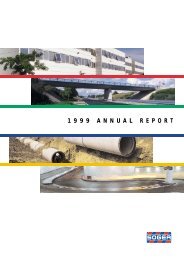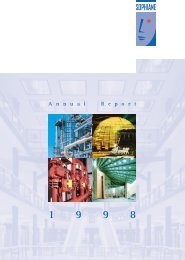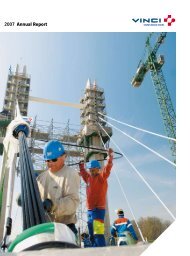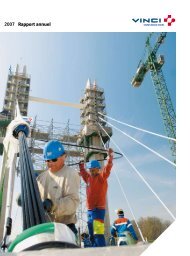VINCI - 2008 annual report
VINCI - 2008 annual report
VINCI - 2008 annual report
You also want an ePaper? Increase the reach of your titles
YUMPU automatically turns print PDFs into web optimized ePapers that Google loves.
B. Internal control and risk management procedures<br />
1. Introduction<br />
1.1 Defi nition–Reference framework<br />
Report of the Chairman<br />
In January 2007, the French Stock Market regulator, the Autorité des marchés fi nanciers (AMF) published the fi ndings of the working group formed<br />
under its aegis. This document is entitled “The Internal Control System – Reference Framework.”<br />
According to this document, which constitutes the reference framework applied by the Group, internal control is a process of the <strong>VINCI</strong> group,<br />
defi ned and implemented under its responsibility.<br />
It includes a set of resources, conduct, procedures and actions adapted to the specifi c characteristics of the <strong>VINCI</strong> group, which:<br />
– contributes to better control of its activities, the eff ectiveness of its operations and the effi cient use of its resources and<br />
– must allow it to take into account, as appropriate, signifi cant risks, whether operational, fi nancial or in respect of compliance.<br />
The system aims more particularly to ensure:<br />
- compliance with laws and regulations;<br />
- implementation of the instructions and guidelines set by Senior Management;<br />
- the satisfactory functioning of the Company’s internal processes, notably those contributing to preservation of its assets;<br />
- the reliability of fi nancial <strong>report</strong>ing.<br />
Nevertheless, like any control system, internal control, however well designed and implemented, cannot provide an absolute guarantee that such<br />
risks have been completely eliminated.<br />
1.2 Scope of application of internal control<br />
The scope applies to the holding company and subsidiaries included within the scope of consolidation. For the specifi c case of the Belgian company<br />
CFE – in which <strong>VINCI</strong> has a 46.84% capital stake – and its subsidiaries, these provisions are adapted to the specifi c features of Belgian law, which<br />
attributes responsibility for internal control to the Board of Directors of companies listed a the stock exchange.<br />
Within this scope, internal control contributes to prevention and control of risks arising from the activities of Group companies and the risks of<br />
error and fraud, in particular in the areas of accounting and fi nance.<br />
2. Organisation and environment of internal control<br />
2.1 Principles of action and conduct<br />
The businesses in which <strong>VINCI</strong> operates require the personnel involved to be geographically close to customers in order to provide them promptly<br />
with solutions suited to their needs. In order to enable the manager of each profi t centre – some 2,500 in total in the Group – to take the required<br />
operational decisions rapidly, a decentralised organisation has been implemented in each of the four business lines (Concessions, Energy, Roads<br />
and Construction) and in <strong>VINCI</strong> Immobilier.<br />
This organisation entails delegation of authority and responsibility to operational and functional staff at all levels.<br />
This delegation of authority to operational and functional management staff is carried out complying with the general guidelines (see paragraph<br />
4.2) and the principles of conduct and behaviour to which <strong>VINCI</strong> is strongly committed:<br />
– rigorous compliance with the rules common to the whole Group, in particular in respect of entering into commitments, risk-taking (see<br />
paragraph 4.3), acceptance of business (see paragraphs 4.4 and 4.5) and submission of fi nancial, accounting and management information<br />
(see paragraph 4.2). These common rules, which are deliberately restricted in number, given the range of the Group’s activities, must be<br />
strictly applied by the staff concerned and their teams;<br />
– transparency and loyalty of managers towards their line management superiors and towards functional departments and the holding company.<br />
In particular, all managers must inform their superiors of any diffi culties encountered in the performance of their duties (e.g. with respect to<br />
carrying out works on sites, relations with customers, government departments, suppliers, fi nanciel partners, internal relationships, personnel<br />
management, safety, etc). Although an integral part of operational managers’ duties is to take decisions alone, within the framework of the<br />
general guidelines received, on matters falling within their area of competence, any diffi culties encountered must be handled with the<br />
assistance, if necessary, of their line management superiors or divisional or holding company functional departments;<br />
– compliance with the laws and regulations in force in the countries where the Group operates, and, in particular, rigorous compliance with the<br />
rules on competition and ethical behaviour;<br />
– responsibility of operational executive managers to communicate the Group’s principles governing conduct and behaviour to their staff by appropriate<br />
means and to set an example. This responsibility cannot be delegated to functional managers;<br />
– safety of persons (employees, external service providers, sub-contractors, etc.);<br />
– a culture of fi nancial performance.<br />
157


